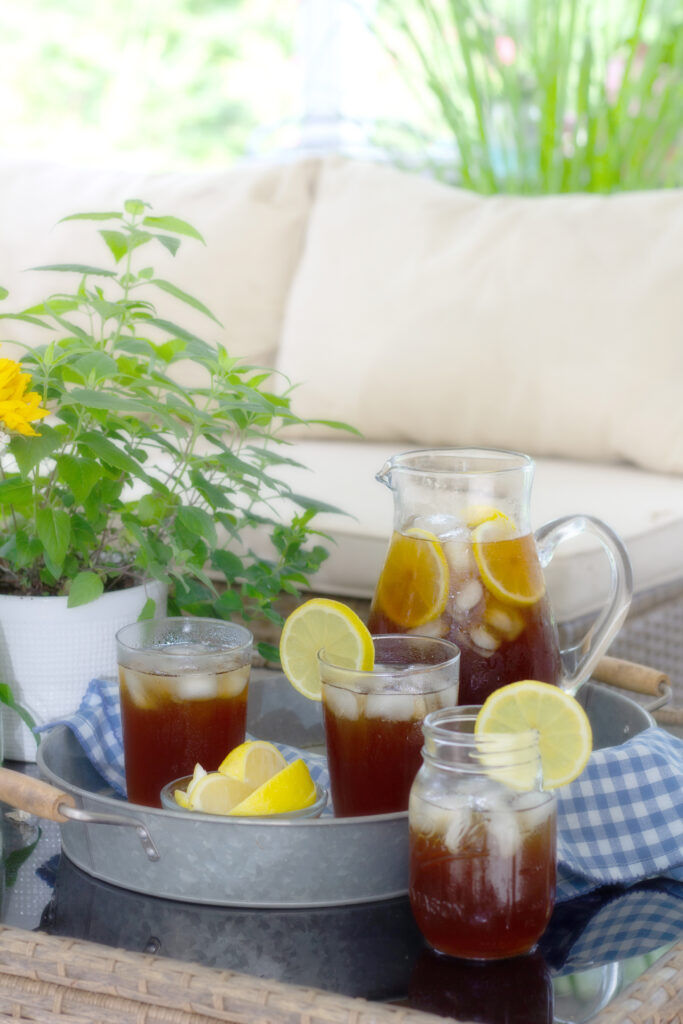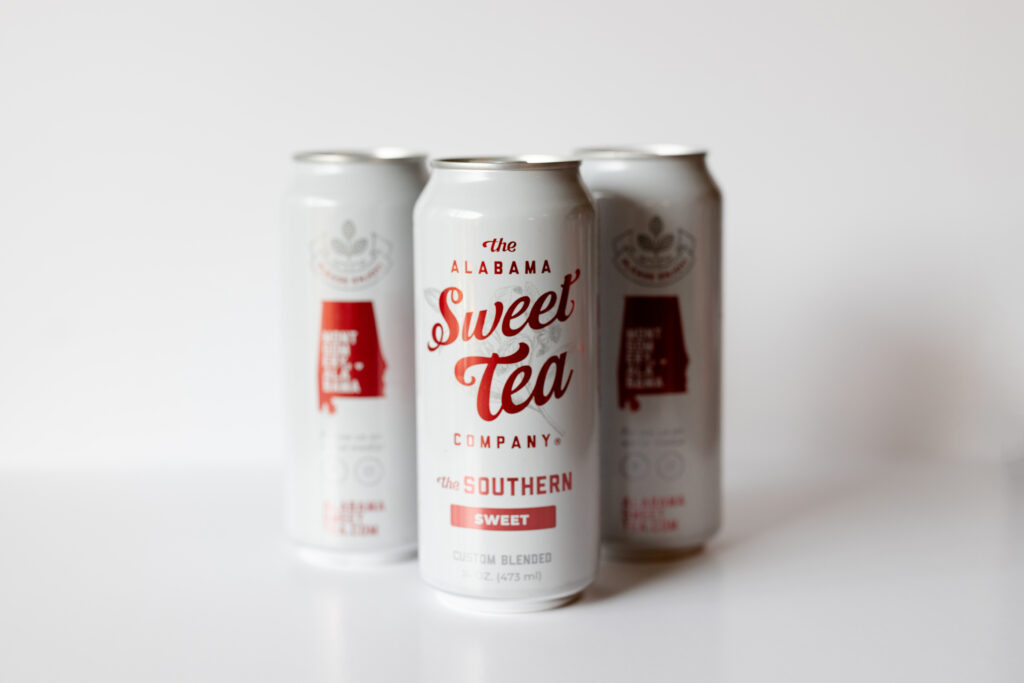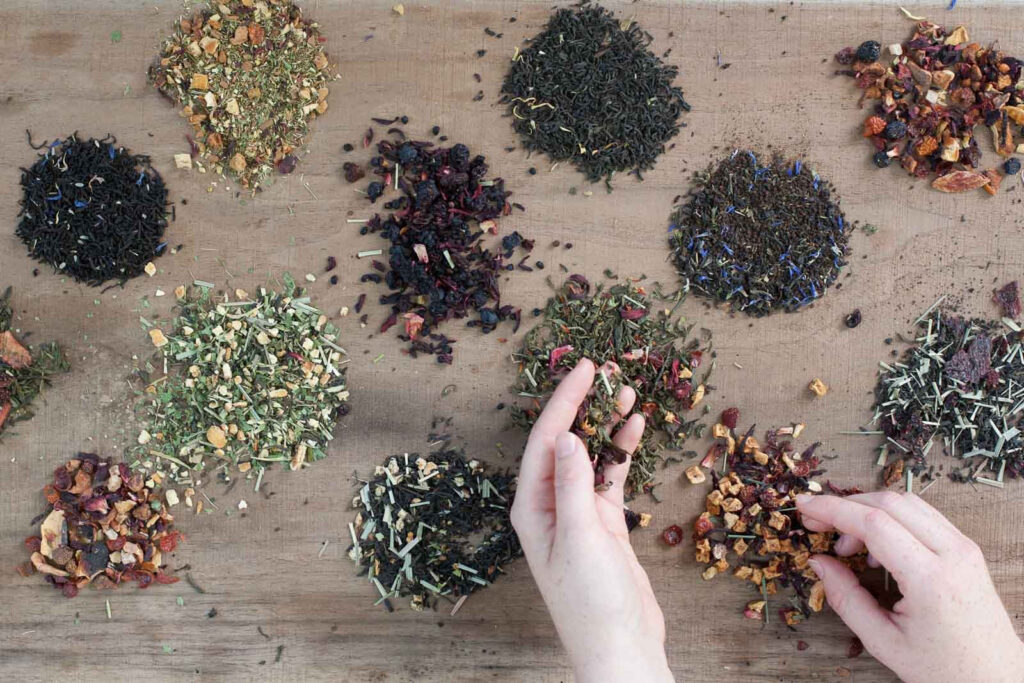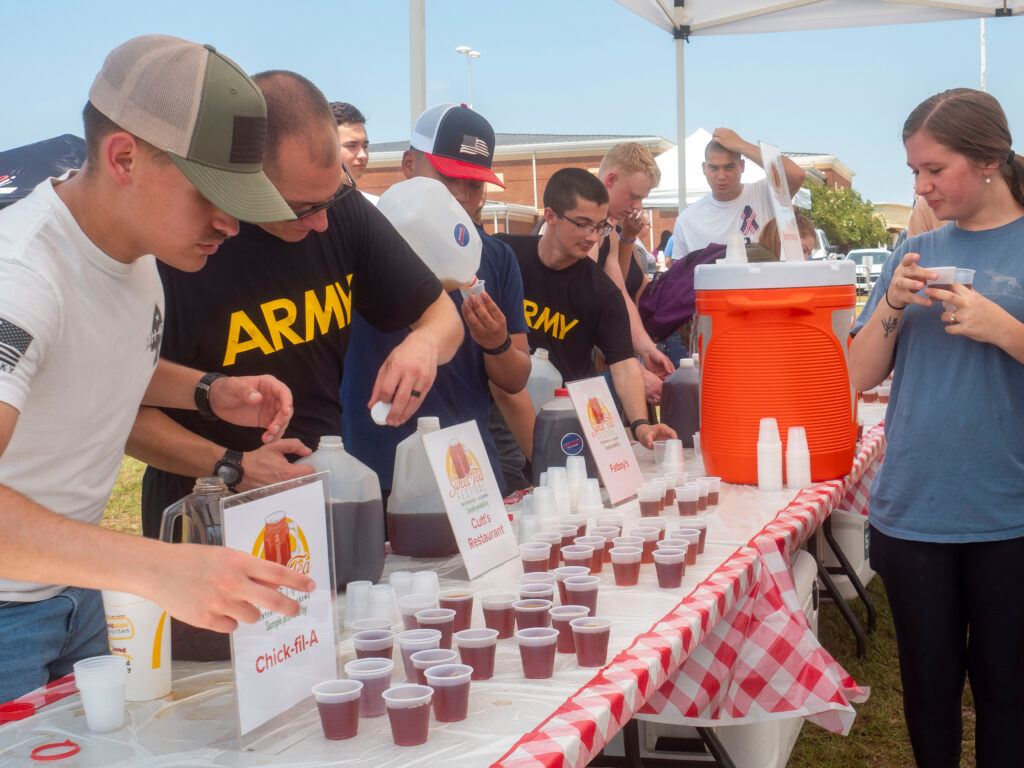Beverage’s ties to Alabama are a strong brew
By Jennifer Kornegay
Southerners seeking refreshment often reach for a tall, cold glass of sweet tea (especially during summer’s swelter). The beloved staple is almost synonymous with the region.
But tea’s ties to Alabama are strong, too. And while saturated with sugar and served over ice is the most common form of tea imbibed in these parts, tea devotees drink it any way they can get it: hot, cold, sweet, unsweet, with a squeeze of lemon, a drizzle of honey, and maybe even a sprig of mint or some fresh-fruit syrups. No matter how you take your tea, you won’t regret steeping yourself in these authentically Alabama tea stories.

On the Farm
Many consider Donnie Barrett, owner of The Fairhope Tea Plantation in Fairhope, Alabama, “the grandfather of tea.” Being one of the major suppliers of tea plants for fellow boutique tea farmers (selling up to 5,000 plants annually all over the country) and his tea farm’s longevity earned him the nickname. In 1979, after Lipton Tea Company abandoned tea-farming research it was conducting in Fairhope, he started his tea farm as a hobby. Barrett took three plants Lipton left behind, which had also been burned but survived, and used knowledge gained while working at a local nursery to save and plant them. He kept adding plants and taught himself how to use the leaves, traveling twice to China to learn tea-making methods. In the 1990s, he bought the land he now cultivates, allowing him to expand his tea crop.
While his efforts eventually blossomed into a business, he’s happy staying his current size, which is tiny compared to commercial tea farms. “I’m an artisan tea maker and produce my tea in small batches,” he says. “That’s how I maintain quality.”
Fairhope Tea Plantation also offers tea farm tours and tastings, welcoming approximately 1,000 visitors annually. After Barrett walks guests through rows of squared-off tea bushes, sharing how he hand-picks leaves starting each year in March and ending in early November, he outlines his process for creating a desirable drink from the harvest.
Finally, guests sample his tea and often take some home. Buying directly from Barrett is the only way to get it, and each year, he sells approximately 300 pounds. “People tell me they love it; some say it’s now the only tea they’ll drink,” he says.
The benefits of Barrett’s tea-growing expertise extend beyond pleasing his loyal customers’ palates. Josh and Stephanie Langley visited him several times and bought some of his plants to start their operation, Langley Tea Farms, in Vincent, Alabama, in 2020. They may be new to tea farming, but not new to the drink. The tea-culture of Josh’s native Hawaii factored into their love story. “When we were dating, we’d go pick out new teas to try together,” he says.
When they moved to Stephanie’s home state of Alabama, they purchased 35 acres of farmland that had been in her family for generations. “We wanted to use the land, and we’re both passionate about tea, so I thought, why not grow some?” Josh says. They learned on the job and made a few mistakes. “We’ve killed thousands of plants,” Josh laughs. “But today, 5,000 tea plants are thriving, with more being planted every year.”
Since tea plants take years to mature, none of the Langleys’ are ready for harvest yet, but they should yield usable tea leaves next year, allowing the farm to finally share the fruits of the couple’s labors. They plan to use a combo of Chinese (wok-fired) and Japanese (steam-heated) drying techniques on their leaves, which are hand-grown with no commercial insecticides or weed killers and only natural fertilizers.
While waiting to make tea from tea leaves, the Langleys produced herbal teas from lavender, spearmint and peppermint grown on the farm. And future plans include adding tours. “I want to help people really taste tea’s different notes,” Josh says. “Like wine, terroir (the conditions in which a food is grown that give a food its unique characteristics) applies to tea; the same plant grown in different spots will have flavors distinct to that location’s soil, its weather and other conditions,” he says.
In the Glass
Wes Willis and Golson Foshee founded the Alabama Sweet Tea Company in Montgomery in 2015 with an understanding of tea’s terroir and how the pedigree of the drink’s principal ingredient, the tea leaf, matters. It’s why the company uses a custom blend of whole-leaf black teas. “It’s funny since our name says Sweet Tea, but our tea to brew at home is actually really good without any sugar added,” Foshee says. “You really get a deep tea taste.”
Today, The Alabama Sweet Tea Company sells its teas for home-brewing online, and its food truck in Waco, Texas, (in partnership with home-renovation stars Chip and Joanna Gaines and their Magnolia brand) sells its prepared teas in mason jars, recently serving the company’s 1 millionth jar.
Soon, its story gets even sweeter, when cans of Alabama Sweet Tea show up on shelves at grocery stores and convenience stores. (The cans are already available to order on the company website.) And by summer’s end, the first Alabama Sweet Tea store will open at The Wharf in Orange Beach. “The whole idea was always tied to having a physical store, we just took the long road to get there,” Willis says. Foshee claims it was worth the wait. “We’re so excited to have our first store Alabama and really connect the brand to our home in a big way,” he says.

Customers should be excited too. The Wharf location allows the company to execute more sweet-tea varieties, including those blended with fruit flavors. “We’ve got about a dozen recipes now, so we’ll have a good menu, and, we’re adding some food like biscuits too,” Foshee says.
The Alabama Sweet Tea Company focused on tea from inception, but Lacey Springs-based Piper & Leaf evolved from another idea. It began when owners and siblings MaryClaire Thomas, Connor Knapp and Brigette Christopher, plus Brigette’s husband Caleb Christopher were making compost and selling it at a Huntsville farmer’s market in 2013. They offered iced tea too. When they quickly sold out of tea, but still had a good bit of compost, they pivoted. “They were selling blends Caleb had been making for himself, and people loved them, so they decided to do a tea business,” says marketing manager Hannah Wilson.
Today, the family-owned and operated company dries, blends and packages a variety of hand-crafted green and black teas, plus caffeine-free herbal teas, selling its loose tea and teabags online and at select retailers and its prepared version at its tea shops in Huntsville (two locations), Madison and its headquarters in Lacey Springs, where customers find gourmet sips ranging from tart and naturally sweet Lemon Berry Blush and spicy Sunrise Chai to the classic Front-Porch Special.
Despite the diverse offerings, common threads include using a Russian method to brew tea into a concentrate before adding water, sourcing fruits and herbs for its blends from local farmers whenever possible (although its tea leaves are imported from all over the globe), and a commitment to sustainability. “We sell our tea in glass jars as well as other reusable drinking containers,” says Wilson, “and our tea bags are made of non-GMO sugar cane, so they are compostable.”
Using a love of tea to create community infuses Piper & Leaf’s philosophy too. “We want to engage with people and have this big happy tea family, so we host tea parties, makers’ markets promoting area craftspeople and other events at our shops,” Wilson says. Piper & Leaf also donates 10 percent of its profits to support fostering and
adoption initiatives.

Tea Party
Each August, Enterprise welcomes approximately 5,000 people to its annual Sweet Tea Festival. Started in 2023, the free event was brewed in the brain of City of Enterprise’s special projects coordinator Kay Kirkland, who was looking for a way to highlight Enterprise’s Southern hospitality as well as the state’s tea makers and growers.
This year on Aug. 16, crowds will come again to sip and savor samples of the South’s “house wine” at the booths of Alabama tea icons like Milo’s, Red Diamond and Royal Cup as well as newer companies, including The Alabama Sweet Tea Company and Y’all Sweet Tea — a Hayden, Alabama, business founded by two friends and college dropouts that made headlines last year for impressing judges on television’s “Shark Tank” and getting funding to grow.
Homebrewers get in on the action too, entering the event’s sweet-tea-tasting contest. “Festival goers try them all and then vote to decide the ‘people’s choice’ winner,” says Tammy Doerer, the City of Enterprise’s director of Tourism and Community Relations. “But we have professional judges too, folks from Milo’s and Y’all Sweet Tea as well representatives from local restaurants.” Last year, 20 people put their tea
to the test.
The tea-chugging contest is more about quantity than quality. “It’s super fun and a favorite part of the festival,” Doerer says. And there’s plenty of food on hand; local restaurants and food trucks serve items that pair well with sweet tea, including barbecue and fried chicken. Live music adds to the mix. But Doerer stresses that the tea-focus remains undiluted. “It will always be about sweet tea and the relaxing, inviting feeling that it represents,” she says.

Sweet Home-Team Teas
Several of the South’s oldest and most famous tea companies have Birmingham roots. Milo’s began as a restaurant in Birmingham in 1946 and became beloved for its burgers covered in a tangy sauce and the sweet tea served alongside them. In 1989, Milo’s started selling gallon jugs of its tea in grocery stores, and it is now available all over the country. Today, the tea side of the company remains in the same family and in Alabama, with headquarters
in Bessemer.
Born in Birmingham in 1906, Red Diamond promises both coffee and tea drinkers its products deliver “the perfect sip.” It’s now headquartered in Moody, and in 2024, the company expanded its tea offerings with an extra sweet and sweet tea and lemonade blend.
Royal Cup also has Birmingham beginnings. Founded as the Batterton Coffee Company in 1896, the name was changed in 1950 with new ownership, and it now imports and roasts coffee and tea for restaurants, hotels and
offices nationwide.
Reading the Tea Leaves
Green and black tea come from the same plant — camellia sinensis. Tea makers achieve the different designations with different processing parameters. For green tea, minimizing the progress of a chemical process called an oxidation-reduction reaction, which occurs in the leaves during drying, gives that variety its fresher flavor. But, to get black tea, the oxidation reduction reaction must keep going; it’s what turns the leaves dark and produces a richer, robust flavor. And a third variety, white tea, is the least oxidized type, resulting in a light, delicate taste
and pale color. ν




